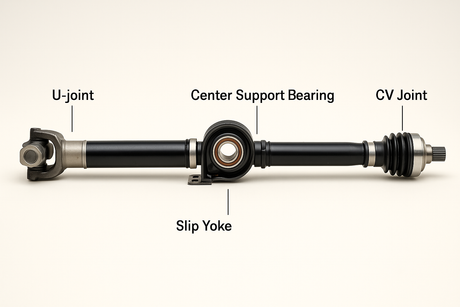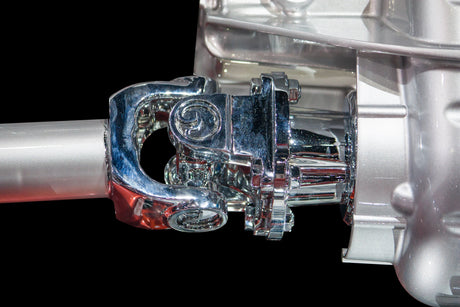Vibration Issues:
Vibrations often occur at certain speeds, particularly when the vehicle is under full power or while coasting.
- Wear and Tear on Slip Yoke and Splines: Excessive wear can cause imbalance and vibrations.
- Worn U-Joints, CV Joint, or CV Centering Kit: Degradation of these components can lead to issues.
- Misaligned or Unbalanced Driveshaft: Ensure the driveshaft is straight and properly balanced.
- Damaged Driveshaft Tube: Dents in the driveshaft tube can cause vibrations.
- Incorrect Driveshaft Angles: Modifications to the vehicle might have altered the angles, causing vibrations.
- Incorrect Driveshaft Length: Driveshafts that are either too short or too long due to improper fitting or modifications.
- Worn Yokes at Differential, Transfer Case, or Transmission: Check for wear in these areas.
- Restricted Movement: Slip yoke and splines should move freely without restriction.
Squeaking or Clunking Sounds
These noises often occur when shifting the transmission into drive or reverse, or when engaging the transfer case or transmission into 4WD.
- Worn or Unlubricated U-Joints or CV Centering Kit: These components may need lubrication or replacement.
- Corroded U-Joints: Rusted U-joints can cause clunking noises.
- Deformed Attaching Yokes: Distorted yokes may prevent proper seating of the U-joint.
- Over-Torqued U-Joint Straps or U-Bolts: This can pinch U-joint bearings, causing noise.
Premature U-Joint Failure
Premature failure of U-joints can result from a few key factors:
- Improper Lubrication: Lack of or incorrect grease procedures can cause U-joints to fail early.
- Excessive Driveshaft Angles: Extreme angles can put undue stress on U-joints.
- Frozen Slip Yoke and Spline: Restricted movement can lead to failure.
- Distorted Attaching Yokes: Deformation can misalign and damage U-joints.
- Over-Torqued U-Joint Straps or U-Bolts: This can prematurely wear out U-joint bearings.
Broken/Twisted Driveshaft or Components
Breakages can often be attributed to:
- Frozen Slip Yoke and Spline: Lack of movement can cause breakage.
- Overloading the Vehicle: Excessive weight can strain and break the driveshaft.
- Severe Driveshaft Angles: Extreme angles can cause structural failure.
- Incorrect Driveshaft Length: A driveshaft that is too long or too short can cause breakage.
- Excessive Torque from Modifications: Modifications that increase torque can over-stress components.
- Improper Vehicle Use: Using the vehicle in a way that subjects it to excessive torque can result in breakages.






